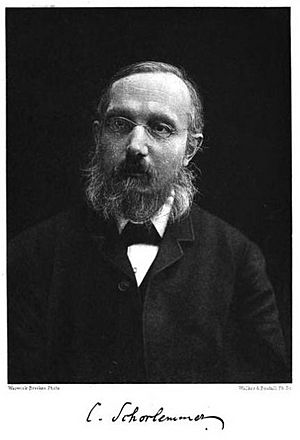Carl Schorlemmer facts for kids
Quick facts for kids
Carl Schorlemmer
|
|
|---|---|
 |
|
| Born | 30 September 1834 |
| Died | 27 June 1892 (aged 57) |
| Nationality | German |
| Alma mater | University of Heidelberg, Victoria University of Manchester, |
| Scientific career | |
| Institutions | Owens College now University of Manchester |
| Doctoral advisor | Robert Wilhelm Bunsen, Henry Enfield Roscoe |
Carl Schorlemmer FRS (born September 30, 1834 – died June 27, 1892) was an important German chemist. He spent much of his life researching chemicals called hydrocarbons. He also studied the history of chemistry, helping us understand how chemical ideas developed over time.
Contents
Early Life and Learning
Carl Schorlemmer was born in 1834 in a town called Darmstadt. His father was a joiner, someone who builds things with wood. Even though his family wasn't rich, Carl was able to go to a good school called a Realschule. Later, he went to a trade school, even though his father didn't want him to at first.
In 1853, Carl began training to become a pharmacist. During this time, he loved doing his own chemistry experiments in the lab. He was also very interested in astronomy (the study of stars and planets) and botany (the study of plants).
After two and a half years, Carl passed his exam and became an assistant pharmacist. He worked in a pharmacy in Heidelberg. He also attended lectures by famous chemists like Robert Wilhelm Bunsen. Carl then went on to study pharmacy and chemistry at universities in Heidelberg and Gießen. Later, he moved to Manchester, England, and became a research assistant at Owens College with another famous chemist, Henry Enfield Roscoe.
Becoming a Professor
Carl Schorlemmer became a professor of organic chemistry in Manchester in 1874. Organic chemistry is the study of chemicals that contain carbon, which are found in all living things.
His important work was recognized by many. In 1871, he became a member of the Royal Society in the UK, which is a very old and respected group of scientists. In 1878, he was also chosen to be a member of the American Philosophical Society.
His Discoveries
Carl Schorlemmer made several important discoveries in chemistry:
- He studied chemicals called paraffin hydrocarbons. These are a type of chemical found in things like natural gas and oil.
- He proved that two chemicals, "ethane" and "ethyl hydride," were actually the same thing. This was important for understanding how chemicals are named and structured.
- He also worked on other important chemicals like Aurin, rosaniline, and safranin. These are often used as dyes.
- He found a way to change one type of alcohol into another.
- Besides his lab work, Carl also spent a lot of time researching the history of chemistry.
His Books
Carl Schorlemmer wrote several books about organic chemistry. One of his most important books was A Treatise on Chemistry (1874), which he wrote with Henry Roscoe.
He also made a big contribution to the study of chemistry's history. His book The Rise and Development of Organic Chemistry is considered very important in this field.
Towards the end of his life, Carl started writing a huge book about the history of chemistry from ancient times up to the 17th century. Sadly, he passed away before he could finish it. The unfinished book is about 1,100 pages long and is kept safe in the John Rylands Library.
Friends with Famous Thinkers
Carl Schorlemmer was good friends with Karl Marx and Friedrich Engels, who were very famous thinkers and writers. They often asked him for scientific advice. Carl was one of only thirteen people who attended Marx's funeral.
When Carl died, Friedrich Engels wrote a special article about him in a newspaper called Vorwärts. Engels mentioned that Carl often spent his holidays in London with him and Marx. Engels also said that Carl was open about his beliefs and that he was one of the people who helped create modern scientific organic chemistry. Because of his friendships, Carl Schorlemmer was sometimes called the "red" chemist.
His Final Years
Towards the end of his life, Carl Schorlemmer's health got worse. He died from a lung disease at his home in Manchester on June 27, 1892. He was never married.
Selected Books
- A Manual of Chemistry of the Carbon Compounds; or, Organic Chemistry (1874)
- A Treatise on Chemistry (1877) - with Henry Roscoe
- Rise and Development of Organic Chemistry (1879)
See also
- List of German chemists
 | Dorothy Vaughan |
 | Charles Henry Turner |
 | Hildrus Poindexter |
 | Henry Cecil McBay |

